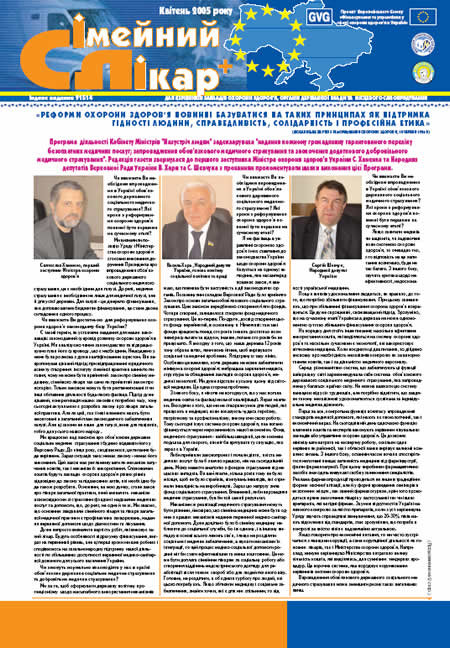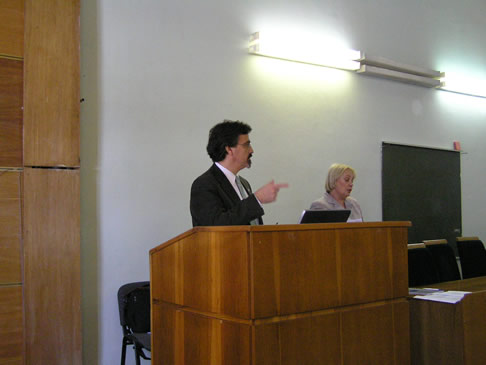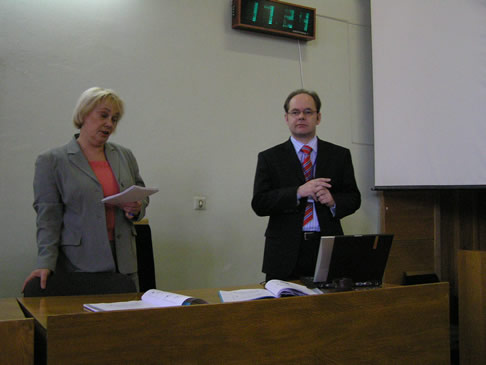


|
Study Tour to Romania The Study Tour to Romania was held during the period from July, 26 till July, 3, 2005. The aim of the tour was to study the experience of introduction of health insurance in Romania starting from the reasons for its introduction to the real results. Participants of the Study Tour were 11 persons: Dr. Antonis Malagardis, the EU Project "Health Financing and Management" Team Leader, Ozar Mintser, Project coordinator from KMAPE, Melania Shkorbotun (Deputy Head of Department of economics and finances, Department of financial and material resources, MOH), Oleksandr Kovalchuk (Chief Specialist, Department of legal provision of juridical provision, MOH), Valentyna Gryschuk, Zhytomyr Oblast Healthcare Department, Valeriy Stanislavchuk, Head Doctor of the rayon hospital in Popelnya, Volodymyr Kostyuk, Head of the Rayon Healthcare Department, Oleksiy Gavva, Head Doctor of Zolochiv Rayon Hospital, Oleksandr Serdyuk, first Deputy of the Oblast Healthcare Department, Vadym Vashchenok, chief consultant of the Social Policy Committee, Roman Mandula, chief specialist, Division of normative-legal support of health insurance of Office of Strategic initiatives and new medical technologies, MOH) The programme was intensive and had a wide coverage, all the aspects of management and financing of healthcare in Romania were studied. In the course of the study tour the following topics were discussed:
As the most important issues that could be used in their work the participants of the School defined the following:
The participants of the Study Tour emphasized urgency and the high level of preparation and presentation of all topics and expressed wish to continue a dialog with Romanian colleagues. The Summer School "Health Financing and Management" The Summer School "Health Financing and Management" organized by the Project on the basis of Jagellonsky University (Krakow, Poland) was held during the period from July, 3 till July, 11, 2005. Participants of the specified Summer School were 14 persons from among those who attended the module-training course for instructors/trainers that was carried out by the Project in cooperation with Kyiv Medical Academy of Postgraduate Education (KMAPO), and upon termination of the specified course successfully passed the appropriate test. The educational group included representatives of the Ministry of Health of Ukraine (2 persons), Kyiv Medical Academy of Postgraduate Education (3 persons), Kiev National Medical University named by academician O.Bohomolets (2 persons), Dnipropetrovsk State Medical Academy (2 persons), Ukrainian Institute of Public Health (1 person), Zhytomyr Basic Medical College (1 person), as well as 2 persons who were recommended for visiting the specified course of training for instructors/trainers on issues of financing and managements in the sphere of healthcare by the chair of healthcare management of the National Academy of Public Administration (NAPA) supported by the President of Ukraine as participants of the Master program in healthcare management of NAPA (these 2 persons represented accordingly concrete health facilities of Yemilchynsky rayon of Zhytomyr oblast and the parallel medical service subordinated of the Ukrainian railway service). The Ukrainian director of the EU Project "Health Financing and Managements in Ukraine" Volodymir Rudy headed the specified educational group. The curriculum covered a wide spectrum of various themes, within the framework of which group participants got acquainted with:
In the course of the Summer School work were discussed such topics that require attention during realization of the further reform in the healthcare system of Ukraine and may be used in the process of training students, managers, medical workers in Ukraine. In particular, participants of the School emphasized urgency and the high level of preparation and presentation of topics connected with explanation of legislative basics of the healthcare system regulation and protection of patients' rights, financing and contraction of medical services, implementation of new methods of payment for medical services, organization of health insurance, activity and development of the institute of family doctors, as well as public and non-public hospitals, privatization and decentralization in the healthcare system, medical services quality control, accreditation and certification of providers of medical services, training of leaders and managers for of the healthcare system. The participants of the School also filled in corresponding questionnaires by results of the training course with their propositions concerning the plan of activity for the sake of supporting the reform of the healthcare system provided on the basis of analyzing lessons of Poland. In view of the specified propositions, the generalized estimation of the most important lessons of Poland, their advantages and drawbacks was developed. As the most important lessons of Poland, participants of the School defined:
V. Rudiy's book annotation "Legal Provision of Healthcare System Reform in Ukraine" Some time ago, "Sfera" publishing house (the city of Kiev) published the book by the Ukrainian Project director of the EU Project "Health Financing and Management in Ukraine", Mr. V. M. Rudiy, "Legal Provision of Healthcare System Reform in Ukraine". In his monograph, the author exposed the content of a person's right for healthcare on the basis of universal and European international and legal acts and recommendations of international organizations. The book describes individual and social aspects of this right, the main principles of healthcare policy, state regulative mechanisms and legislative functions in this sector, which are commonly accepted in the modern civilized community. To evaluate compliance with principles, which are accepted by the international community, the content of people's right for healthcare, defined by Ukrainian legislation, and approaches to formation and implementation of healthcare policy were analyzed. There is the presentation of the general view, evaluation of structure and content of the modern medical-sanitary legislation of Ukraine as a tool of state regulation in the healthcare system. Taking into account its critical importance for health reform, a special attention is paid to the analysis of issues on legislative regulation of financial and economic relations in this system. A number of well-grounded author's propositions as to improvement of the Ukrainian national legislation are shown to promote implementation of the national healthcare system reform that stipulates introduction of modern strategies in controlling expenditures, resource distribution and quality provision in health service sector, which effectiveness is proved by the experience of majority of European countries. The healthcare reform also anticipates transition from the current integrated command-administrative to a more effective and efficient contracting model of management and financing in the healthcare system, which is based on the principle of distinct split between purchase's and healthcar provider's functions, introduction of contracting relations between them using the model of strategic state procurement of health services and improvement of the level of administrative and economic autonomy of healthcare providers. The described above research is intended for policy-makers, managers of national local levels, healthcare system managers, scientists, students and researchers who study the issues of organization and management in healthcare and health legislation. This book can also be useful for all those who are interested in the issues of reforming Ukrainian healthcare system. Ukraine - Romania: Discussion Club According to the results of the training tour to Romania an agreement on further experience exchange between Romania and Ukraine was achieved and the dialogue between two countries about health reform was continued. To cover these issues a new section Ukraine - Romania: Debating Club will be made on the Project web-page. In this section one will be able to find information of the key aspects of health insurance implementation in Romania, articles written by Romanian and Ukrainian experts, etc. Participants of the training tour to Romania which took place 26 June - 3 July 2005 are welcome to share their impressions of the tour, tell how they use new knowledge in their work and ask Romanian colleagues any questions which might have arisen after their returning to Ukraine. Finalizing the Train-the-Trainers course 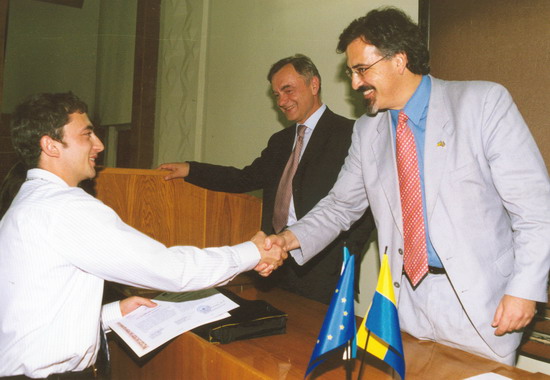 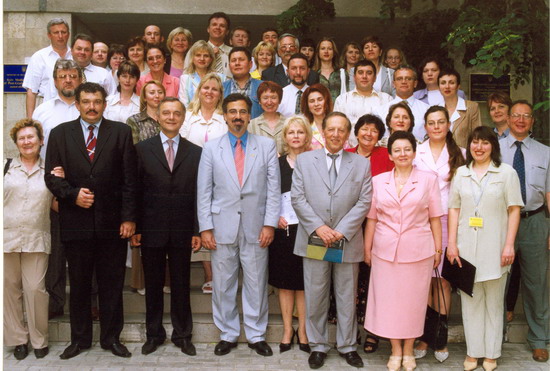 Healthcare reforming process requires involvement of high qualified specialists. That is why there is an extremely important activity of the EU Project "Health Financing and Management in Ukraine" - Train-the-Trainers course - within the training component of the Project. On June 16, 2005, this training course on health financing and management was finalized. It was organized by the EU Project "Health Financing and Management in Ukraine" in co-operation with Kyiv Medical Academy of Post-Graduate Education named after P. L. Shupik (KMAPE), and the Ministry of Healthcare of Ukraine, according to the curriculum that had been approved by the Academic Board of the KMAPE. The training process was set up with account for teaching staff of medical educational establishments who are the 'core' of the health sector in Ukraine, and who will be instructors/trainers within the Project. After the Project, they will teach graduate and post-graduate students. Besides that the participants of this training course were representatives of Ministry of healthcare of Ukraine as well as Project representatives. The training course included 8 specific topics:
The main tasks of this training course were the following:
Throughout the training course, the participants learnt from lectures of international and local experts from Poland, Sweden, Finland, Germany, Greece, Romania, and Ukraine. The training course concluded in the final test for the participants. After the final test, the participants who passed the test successfully, received certificates from the KMAPE and the EU Project "Health Financing and Management in Ukraine". The Module #8 "Hospitals and policlinics in XXI century" of the TTT course On 14-15 June, 2005, Module #8 "Hospitals and policlinics in XXI century" of the TTT course was held in Kiev. In the course of the seminar the following presentations were presented:
Practical group work was devoted to issues related to drafting the Master Plan to re-organize a healthcare facility to an autonomous health provider, as well as the Master Plan for restructuring Ukrainian healthcare facilities; finding new ways of health financing to be introduced in the Pilot regions of the Project. The Fifth Meeting of the Project Steering Committee 30 May 2005 the fifth meeting of the Project Steering Committee took place. Khanenko Svyatoslav Mykhailovych, First Deputy Health Minister of Ukraine, Head of the Project Steering Committee; Dr. Antonis Malagardis, Team Leader; Polyuk Sergiy Pavlovych, EU Health and Social Projects Coordinator; Mudruk Vitalia Semenivna, expert of TACIS and Balkans Monitoring Program; Rudyi Volodymyr Myroslavovych, Ukrainian Project Director; Karamushka Larysa Illivna, Director of the Economy, Finance and Property Relations Department at the Ministry of Health; Pidgorna Lyudmyla Mychailivna, Deputy Head of the Economy, Finance and Property Relations Department at the Ministry of Health; Vitrenko Yuriy Mycholayovych, Head of the Humanitarian Development Administration of the Ministry of Economy and European Integration of Ukraine; Tretetskyi Vasyl Pylypovych, Deputy Head of Kharkiv Oblast State Administration; Gavva Olexiy Konstyantynovych, Head of the Health Administration of Zhytomyr Oblast State Administration; Stanislavchuk Valeriy Dmytrovych, Head Doctor of Popilnya Central Rayon Hospital took part at the Committee's work. Khanenko Svyatoslav Mychailovych took the chair. He hoped that there would be some positive changes in Ukraine in the nearest future. Dr. Antonis Malagardis introduced members of renewed Project Steering Committee and briefed on the Project results during last 5 months. The Assessment of the Project Performance in Kharkiv and Zhytomyr
Pilot Regions and the assessment of changes that took place in the healthcare
structure in Pilot rayons was provided by Tretetskyi Vasyl Pylypovych, Gavva
Olexiy Volodymyrovych, Tolstanovyi Olexander Konstyantynovych, Stanislavchuck
Valeriy Dmytrovych. Round Table "How to Execute Article 49 of the Constitution of Ukraine?" 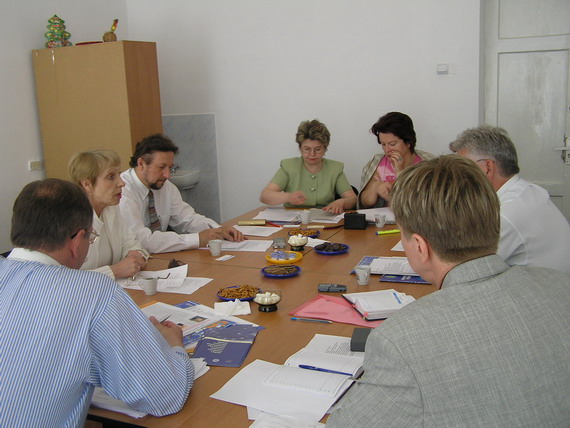 On June 3, 2005 the Round Table "How to Execute Article 49 of the Constitution of Ukraine?" was held in the conference-hall of the Project's office together with the Editorial Board of the newspaper Dzerkalo Tyzhnya (Week Mirror). Journalists of the newspaper Dzerkalo Tyzhnya Lidia Surzhyk, Olga Skrypnyk, Andriy Huk, the Project Polisi, Vitaliy Chernenko, the Head of the Secretariat of the Verkhovna Rada Committee on Healthcare, Maternity and Childhood, Sergiy Shevchuk (the Verkhovna Rada Committee of Ukraine on European Integration), Konstynatyn Nadutyi, the Deputy Head of the Family Medicine Association (Komsomolsk town), Professor Valeria Lekhan (Dnipropetrovsk State Medical Academy), V. Rudyi, L. Batih, N. Luchsheva, experts of the EU Project Health Financing and Management in Ukraine, journalists of the TV-program Perekhrestya (Crossroads) took part in the discussion. The present situation in Ukraine and constant breach of Article 49 of the Constitution (guaranteeing the right to free-of-charge healthcare which in fact doesn't match today's reality) gave an impetus to the discussion. S. Shevchuk admitted that today people actually pay for all healthcare services but they don't pay for these services officially. V. Lekhan added that the reason of all problems in the sphere of healthcare is irrational fund utilization. Public health itself is not priority for the state. If the approach to the problem is changed, the situation in the sphere of healthcare will be changed as well. V. Rudyi, the Ukrainian Director of the Project, agreed with Professor V. Lekhan. He stressed the importance of developing the strategy of costs containment and effective resource utilization in a healthcare sphere. Another important issue is transfer of integrated command-administrative management and financing systems to the contractual system. S. Shevchuk underlined that the government had not executed any Decrees on Healthcare approved in recent years. As far as free-of-charge healthcare is concerned, in his opinion it can be free-of-charge but only within a set budget. V. Rudyi stressed the importance of enhancing the Ukrainian legislation, 'Our legislation demands improvement and development of its conceptual structure. Our Constitutional Court opposed such concepts as healthcare and healthcare services that are synonyms. It is necessary to define what services are free-of-charge and which are to be paid. Today it is worth talking not about the alternation of Article 49 of the Constitution but about its different interpretation. There is Article 68 of the Constitution which describes the possibility of the second trial if some important issues have not been considered during the previous trial.' V. Lekhan added, 'Article 49 provokes shadow payments as if it is impossible to pay legally, the number of illegal payments increase in several times. Article 49 of the Constitution does not allow to introduce co-payment for healthcare services.' An alternative thought was expressed by Vitaliy Chernenko, 'Article 49 of the Constitution does not interfere with heath reform in Ukraine.' Konstyantyn Nadutyi said that Article 49 of the Constitution cheats population. There is the other side of the coin. It is to some healthcare workers' advantage that the situation remains the same and they can continue getting non-taxed shadow payments. V. Rudiy summed up the discussion, 'Healthcare reform is a constant process; it is a long way which will have both ups and downs. But today the society has understood an important thing - we can't stay indifferent.' According to the materials of the round table, an analytical article will be prepared in the newspaper Dzerkalo Tyzhnya and a special broadcast in the TV-program Perekhrestya (Crossraods). The Seventh Training Module Leadership and change of the Training The Trainers (TTT) course 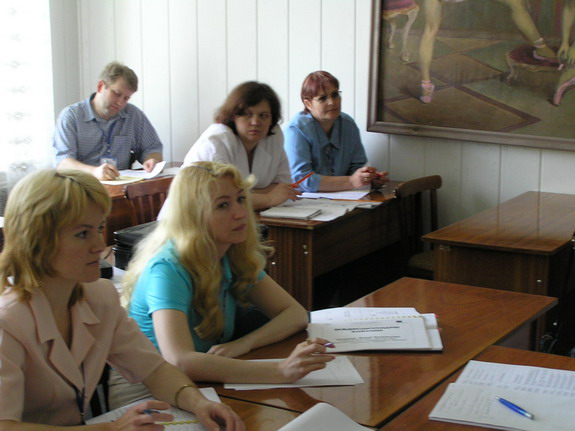 On 24-25 May, 2005 module 7 "Leadership and change" of the TTT course was held in Kiev. In the course of the seminar the presentations of experts from Sweden Runo Axelsson and Susanna Bihari Axelsson were presented. In particular were considered the following issues:
Dr. Runo Axelsson touched the issues:
Then the expert characterized the Swedish healthcare model The presentation of Dr. Susanna Bihari Axelsson "Management of changes" was dedicated to forms and models of planned and emergent change. The expert described the organizational life circle and listed problems in connection with change. In her view it is very importing is to develop the strategy of conflict management while implementing changes. Another presentation of Pr. Axelsson "Organizational Learning and Finance-based Management" was dedicated to organizational learning issues. According to Pr. Axelsson organisations have an ability to learn, to unlearn and to relearn. Organisational learning is not the sum of individual learning in an organisation. It results in cognitive systems, values and memories that are shared by the members of the organisation. It is influenced by the organisational culture, structure and environment. Practical work in groups was devoted to building a coalition in the health sphere at National and regional levels. The second issue of the «Family Doctor+»
The second issue of the Family Doctor+ (ѳìåéíèé ë³êàð+) newspaper has been issued. It is dedicated to the topic of health insurance. The opinion on health insurance of top-officials from Verkhovna Rada of Ukraine, Ministry of Health are proposed to readers attention. Experts from Finland , Czech Republic , Romania inform about experience on health insurance implementation in their countries. Information about different event which Project took part in are rather interesting. It is worth of reading data of survey made by Cathedra of Management in Health Care and Valeology of Odessa Regional Institute of State Administration aiming to study point of view of medical workers on health insurance and controlling survey made by Project experts in Zolochiv and Popilnya on necessity of radical changes into health care system appraisal of existing health care system, increasing of conversance of the population with health reforming issues and their confidence in different sources of information. The edition published international news as well as other interesting information.
The 6th Training Module “Information Technology (IT) Systems for Purchasers and Providers” of the Training The Trainers (TTT) course . On April 12-13, the 6th Training Module “Information Technology (IT) Systems for Purchasers and Providers” of the Training The Trainers (TTT) course was held in Kyiv. In the course of the module the following presentations were done: • Modern Information System Architecture in Health Care for Ukraine (what has been done and what should be done) Prof. O.P. Mintser • e-Health – The ICT environment for Healthcare From medical informatics to e-Health (Jarosz, M.J.) • e-Health – The ICT environment for Healthcare. Healthcare application and their ICT requirements. ( Jarosz, M.J.) • ICT support for regional/national/district health care systems . (Jarosz, M.J.) • Information for payers, providers and controlling authorities - Polish experiences (RUM).( Jarosz, M.J.) • Standards, integration and communication tools (EDI, EHR, HL7, XML, data security, identification, authorization, authentication) (Jarosz, M.J) • ICT for healthcare in Ukraine : Project implementation in the Pilot regions. (Dyachenko, S.O.) • Implementing and organizing the ICT services for Health care providers. Part 1. ( UK and France examples) (Sala, D.) • Implementing and organizing the ICT services for Health care providers. Part 2 (Sala, D.) • e-Health: examples of the regional/national healthcare projects (Sala, D .) • EU e-Health Initiatives and action plan as a catalyst to new HC procurement models in EU (Sala, D.) • The draft healthcare ICT strategy for Ukraine (Linnakko, E)
Practical work in the groups was devoted to the issue of ICT implementation in Ukraine .
The Fifth Training Module “Insurance and Financing” of the Training The Trainers (TTT) course
On 15-16 March 2005 the fifth module “Insurance and Financing” of the TTT course was held in Kyiv within its training program. In the course of the module the following presentations were done:
The first presentation of Dr. Antonis Malagardis, “Social Health Insurance Design and System Components: Population Coverage, Benefit Package”, consisted of four parts. In course of this presentation, Dr. Malagardis pointed to the main categories of funding, spoke about the advantages and disadvantages of health insurance, as well as about planning of benefit packages and entitlements. In particular , the advantages of social health insurance (SHI) are:
At the same time, SHI has its disadvantages:
Besides that Dr. Malagardis answered the questions: How to design a population coverage policy?, Compulsory or voluntary membership?, How to plan benefit packages?, How to plan entitlement provisions?
The presentation “Cost estimation, Financing and Administration of Social Health Insurance” of Dr. Malagardis was devoted to issues:
In the course of his third presentation, “Collection & Pooling of funds: Selected countries experience”, the speaker drew attention of the audience to the issues:
An expert from Poland, Mr. Adam Kozierkiewicz, gave presentations on topics: ” Social Health Insurance and Provider Payment systems: Advantages and Disadvantages”, “Social Health Insurance problems – how to regulate relationship between solvency, rates and quality of care”, “Drawing on the experience of EU with Social Health Insurance systems & Building Consensus in Ukraine”. Mr. Kozierkiewicz classified healthcare systems of different EU countries. In particular, he gave characteristics of Bismarcian and Beveridgian insurance models. According to Mr. Kozierkiewicz, different countries faced with same problems: • Who is to be covered? • Who is to provide finances? • How to collect funds? • What institution manages the funds? • What is a mechanism of distribution funds? • What should be covered? • How to control output/outcome?
Further, the expert touched the issues of payment mechanisms, in particular, in relations to acute hospital care, day-care surgery, ambulatory specialist services, primary care services, nursing care. The last part of Mr. Kozierkiewicz's presentation was an analysis of achievements and mistakes of selected EU countries ( Hungary , the UK , Germany and Finland ) while introducing health reform.
The Fourth Training Module of the Subject Advancing Course On 22-23 February, 2005 the fourth module "Human Resource Management, Quality Management, Purchase Control and Pharmaceutical Management" was held within the training program. In the course of the module, Aurora Dragomiristeanu (an expert from Romania), gave 4 presentations: 'Communication Skills - Concepts, Methodology and Ways of Improvement, Talks and Conflict Solution', 'Control Management - Motivation, Changes and Introduction of Innovations' and 'Simplification of Purchases. Romanian Experience'. Mrs Dragomiristeanu pointed out the importance of communication to achieve assigned tasks and spoke about different types of communication. Further on the expert defined team as a small group of people having complementary skills and abilities who focus on achieving a common goal and who act as a solid team on the basis of personal responsibility. Negotiations and Conflict Solution presentation was devoted to the preparation and conduct of negotiations. In the course of her report Mrs Dragomiristeanu described the structure, principles and basic stages of negotiations; she explained why conflicts arise during the talks and what the optimum ways of their solution are. In particular, the main goal of talks is:
For talks to be successful it is necessary:
The presentation Management of the Control - Motivation Process. Changes and Introduction of Innovations drew attention of the audience to the process of changes implementation and their management and how the use of some managing and behavioral scientific methods influences efficiency improvement of the facility's work. In the course of the presentation Simplification of Purchases Mrs Dragomiristeanu shared her Romanian experience regarding health financing after implementing the Law on Social Health Insurance and told how mechanisms of healthcare services payment operate in hospitals, and, in particular, how primary healthcare and services are paid in specialized out-patient clinics. The presentation of Professor Rafal Nizankowskiy, an expert from Poland, 'Quality - Definition, Measures, Methodology and Techniques', 'Programs on Quality Control - Quality Monitoring' were devoted to the interpretation of such a notion as quality in a healthcare sphere. According to Mr Nizankowskiy quality means doing necessary things properly. Thus his presentation Programs on Quality Control - Quality Monitoring was devoted to the definition of quality indicators of the healthcare services provided in different healthcare areas. Quality improvement should take place through the implementation of the following components:
Professor Nizankowskiy gave an overview Picker Institute research data. Patients consider care in a healthcare facility to be a quality constituent of the received services. The following aspects of satisfactory care were defined:
Practical work in groups was devoted to the investigation of patients' content with healthcare services. The Family Doctor+ (ѳìåéíèé ë³êàð+) newspaper 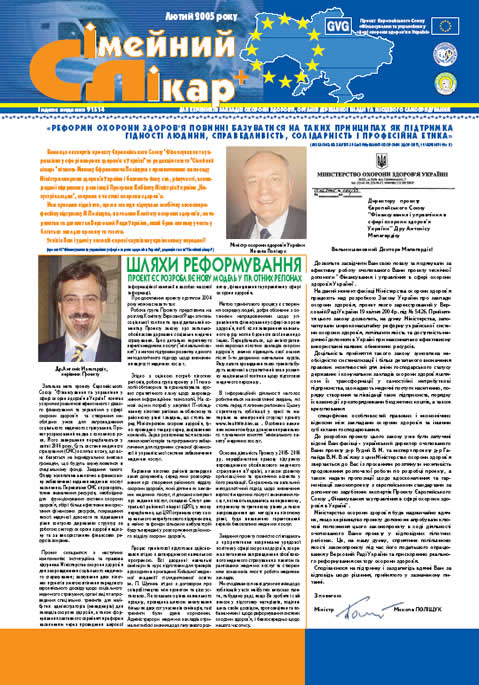 The EU Project "Health Financing and Management in Ukraine" together with the international NGO "Women Community" (Ƴíî÷à ãðîìàäà) have established the publication of the "Family Doctor+" newspaper. This newspaper is targeted at the administrators of healthcare facilities, local authorities, self-governance bodies and physicians as its readers. The first issue of this newspaper was published at the end of February, 2005. It contains the welcoming letter of the Minister of Health of Ukraine, Mr. Mykola Polischuk, to the Project Team Leader, Dr. Antonis Malagardis, in which there is a high estimation of the Project activities. Besides, on the front page there is published Dr. Antonis Malagardis' article, in which there is a review of the Project achievements and set priorities for the upcoming year of 2005. In addition, the "Family Doctor +" proposes to the readers' attention the opinions of international and Ukrainian experts on different issues of health system reform and gives the overview of the recent international news and events in health sector. Throughout the Project activity, there are six issues of this newspaper planned. The next issue will be printed out in April 2005. For the details of the first issue of the "Family Doctor+" newspaper, please refer to SvitUA portal at www.svitua.com The second and third modules of the training course for coachers 25-28 January 2005 the second and third modules, "Planning and Management" and "Introduction to Healthcare Economy", of the training course for coachers were held within the program of trainings. In the course of the second TTT module "Planning and Management" Andres Rennamae, an expert from Estonia, presented his presentation "Basics of Management". He initiated the participants to the elements of management, i.e., planning, organization, staff provision, management and control. He also explained what management theory and styles are, and what are the specifics of healthcare facility management. Jacek Klich, an expert from Poland, presented his presentations "Operative Planning" and "Strategic Healthcare Management". He formulated main targets and elements of a business plan and stated the importance of financial management. In addition, Mr Klich provided the definitions of main terms used in financial management, he also told about Polish experience in financing healthcare facilities and the ways of exercising accounting and financial control. Besides, the expert explained the term budget and, as an example, he offered to consider the budget plan of a multi-field hospital in Poland. In the course of the discussion in working groups the following issues were discussed:
The third TTT module "Introduction to Healthcare Economy" was devoted to the economic issues. Dr. Markku Pekurinen, an expert from Finland explained;
He also talked about the application of economics as a science in the sphere of health by defining such notions as efficiency and productivity, profit and expanses and demand and supply in the sphere of healthcare. He also discussed on the correlation between the price of services provided and demand of services. In the end, he told about the criteria for healthcare resources allocation taking into account consumers' needs. According to him these criteria should reflect actually existing demand for healthcare services and they should not depend on existing resources. The healthcare resources are distributed among regions according to the index of relative need using the general distribution formula or a specific formula that is determined by type of a service. His counterpart Professor Pekka Rissanen was speaking on "Principles of Economic Appraisal in the Sphere of Healthcare". He defined such concepts as efficiency, equity and value in medicine stressing that available restricted resources should be used in such a way that they provide the highest possible improvement in health (value maximization). He distinguished two types of healthcare values: monetary and non-monetary. Healthcare efficiency is determined through the changes in a person's state of health that point out successful approach to the healthcare targets. Such notions as cost and benefits were explained as well. Practical work in the groups of the third module was devoted to these issues:
Workshop "Legal and Organizational Changes in Pilot Regions and Assessment of Their Financial Impact for Ukraine" 9-10 December 2004 Legal and Organizational Changes in Pilot Regions and Assessment of Their Financial Impact for Ukraine workshop took place in Kyiv. The following presentations were given within the seminar.
The working groups discussed the issues of global budget implementation in two central rayon hospitals (Zolochiv and Popilnya), the organizational structure, functions and financial reporting of the purchaser within the system of health services provision. G.Siroshtan, the Deputy Head of the Healthcare Administration of Kharkiv Oblast State Administration, provided the audience with the information on Zolochiv Rayon Council's decision to transfer Central Rayon Hospital under the management of Rayon State Administration to provide its financing from the rayon budget. V.Pariy, the Head Doctor of the Communal Enterprise Oblast Health Consultative-Diagnostic Centre reported on the plan of activities regarding the implementation of cooperation agreement within the EU Project Health Financing and Management in Ukraine for 2004-2005. According to the plan, the following activities are envisaged:
O. Gavva, the Head Doctor of Zolochiv Central Rayon Hospital, presented the draft contract on healthcare services provision according to which the Healthcare Department of Zolochiv Rayon State Administration becomes the Purchaser of healthcare services provided by the communal non-profit healthcare enterprise Zolochiv Central Rayon Hospital. The Head Doctor of Popilnya Rayon Hospital, V. Stanisalvchuck spoke about the organizational structure of healthcare facilities of the rayon and gave a brief outline of their financial provision. In his presentation IT support for the implementation of changes in the pilot sites - an overview of hardware & software O. Kovalenko, a Project expert, talked about the aim and tasks of the IT health system establishment in pilot regions, defined main directions of the activity in the sphere of healthcare services that require IT-support. Namely, these directions are:
IT support for Pilots After competitive biddings the Procurement unit of the Delegation of European Union in Ukraine selected two companies to procure information technologies to two pilot oblast of the Project. After the signature of the Contracts servers and related IT technology and PC will be delivered to the Ministry of Health, oblast administration and pilot hospitals. The aim of this investment is to test the regional information communication system and patient administrative system and new economic software in Pilot hospitals. The final goal is to create a model for other oblasts to follow later. Book presentation "Health Ñare Systems in Transition. Ukraine" The European Observatory on Health Systems and Policies supports and promotes evidence-based health policy-making through comprehensive and rigorous analysis of the dynamics of health care systems in Europe. The Observatory is a partnership between the WHO Regional Office for Europe, the Governments of Belgium, Finland, Greece, Norway, Spain and Sweden, the Veneto Region of Italy, the European Investment Bank, the Open Society Institute, the World Bank, the London School of Economics and Political Science (LSE) and the London School of Hygiene & Tropical Medicine (LSHTM). The European Observatory on Health Systems and Policies have published a book entitled "Health Care Systems in Transition. Ukraine" . The authors of the book are Valeria Lekhan, Head of the Department of Social medicine and health care administration within State Medical Academy in Dniepropetrovsk, Volodymir Rudiy, Ukrainian Director of the EU Project "Health Financing and Management in Ukraine", and Ellen Nolte (The European Observatory on Health Systems and Policies). This book is the first analytical review of the current health care state in Ukraine and the processes occurring within the given system. It has been created in compliance with the WHO standards and has occupied its place in the global research of health care systems of other countries. The book includes:
The scientific work in a detailed way covers various approaches to the organization, financing and health services provision; describes the specific character and the process of health care reform implementation; pinpoints the sectors of health care demanding a more profound analysis; gives a possibility to share experience and compare health care in Ukraine to those of other European countries. The authors of the book consider the main problems of health care and explain the reason of slowdown in fundamental health care reform in Ukraine - they stress out the direct interrelation between economic and political processes in the country and the health care state, in particular, they comment on the issue of passing the Law on social health insurance in Ukraine. The book also focuses on the importance of adequate professional training of medical staff under existing conditions. The book is published in English. The Russian version is expected to appear in 2005. The English e-version is available at www.observatory.dk The First Module of the Training of Trainers Program On the 16th - 17th of November the first module "Health Sector Development" of the training course for future instructors was held. The following topics were discussed at the module:
The lecturers discussed general criteria of health status assessment and defined the main determinants affecting overall level of public health. A Polish expert, Jacek Gralinski, dedicated his presentation to consideration of the concept "health impact assessment" and to the way the concept was taken into account at working out of the medical strategies and plans. Professor Nina Goyda spoke about the goal of restructuring the health care system in Ukraine and the measures taken to reorganize the health sector, characterized the national health care system founded according to Semashko's model. Besides, Nina Goyda enumerated the main problems of the health care system that were considered top-priority. Adam Kozierkiewicz informed the audience on evolution of the health care system in Poland, France and the United Kingdom. He told about the goals of reforms in those countries, what they had obtained, and what problems had not been solved yet. 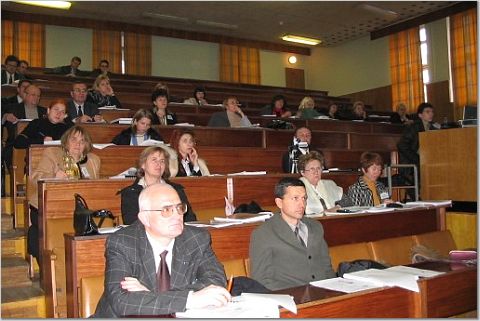 "Contracting Between Purchasers and Providers: Issues for Ukraine" On the 19th - 20th of October the Project of the European Union "Health Financing and Management in Ukraine" held an open seminar dedicated to the topic "Contracting Between Purchasers and Providers: Issues for Ukraine". Mr. V. Zagorodniy (the Deputy Minister of Health of Ukraine), Ms. L. Pidgorna (the Head of the Department of normative legal provision of the health insurance of the Ministry of Health of Ukraine), administrators of the medical institutions, foreign experts from Germany and Estonia, a number of scientists and journalists took part in this seminar. In his welcoming speech, Mr. V. Zagorodnij emphasized the importance of following a realistic approach while introducing health reforms. The Project Team Leader, Dr. A. Malagardis stressed the needs of using of foreign experience for solving problems of Ukrainian healthcare system. The following presentations were presented and discussed at the event:
The presentation by the Ukrainian Director of the Project, Mr. V. Rudiy, was dedicated to examining the effective legislative basis in Ukraine and existing opportunities and obstacles to implementation and effective functioning of contract relationships in the area of purchasing and providing health services. In Mr. V. Rudiy's opinion, the existing legislative basis in Ukraine allows implementation of the simplest contracts for purchasing health services at state's expense. Even under the present legal conditions such contracting is possible and necessary for both improving the existing financial system and acquiring experience necessary for implementation of the mandatory health insurance. However, in order to provide effective use of this important strategy these problems, among others, need to be solved:
Galyna Naduta, the Deputy Head of Healthcare Department of Komsomolsk town hall, used the materials of innovative development of the field. She shared experience on contracting in the field of health care in the town of Komsomolsk. She reported on what made them to introduce reforms, on the results they had expected, and on the current situation in healthcare in the town of Komsomolsk. International experts, Maris Jesse and Bela Kaunzinger referred to health contracting experience in Estonia and Germany. The legal aspects of introducing contract relationships and typology of contracts were discussed in the working groups' sessions. In addition to that, the draft of the contract between the provider and the purchaser of health services for the pilot regions was presented for consideration to the seminar participants. Defining and Costing Health Services 28-29 September 2004 the seminar "Defining and Costing Medical Services" was held in Kyiv. There were representatives of the Ministry of Health of Ukraine, healthcare administrators, scientists, international experts, journalists at the seminar. At the beginning of the seminar work the Project Team Leader Dr. Antonis Malagradis referred to the participants admitting that other European countries' experience in healthcare cost determination is extremely important for Ukraine that is verging towards healthcare reform. Volodymyr Zagorodniy, Deputy Minister of Healthcare of Ukraine, admitted that development of professional management and training of relevant specialists are important constitutive parts of national healthcare reform. To his mind, training of healthcare management specialists should be carried out in accord with a separate program of specialist training at higher educational institutions. Eero Linnakko, Project Deputy team Leader, defined health as a commodity in his presentation and healthcare services as original reinvestments that have to facilitate health restoration and that is why quality improvement and reduction of prime-cost of health is becoming the foremost task of healthcare economy. The expert from Poland, A. Kozierkiewic dwelt on the aspects of practical use of payment per case system because it is priority in many developed countries of the world. The following topics were covered at the seminar presentation:
Information brochure issue On the basis of the materials from the open seminar "Health Insurance: EU Experience" (presentation of Ukrainian Project Director V.Rudiy), which took place in Kiev, 18th - 20th May 2004, an informational brochure entitled "Mandatory health insurance implementation: legal framework" has been issued. The brochure includes six basic parts:
The brochure presents ground principles laid in the basis of the Ukrainian legislation on Health Care and formulates the essence of the public social security concept. It also considers negative aspects of legislative framework for MHI launching, provides the statutory interpretation of basic conceptual distinctions of the existing Draft laws on MHI. In addition, the brochure defines the steps to be taken to improve the legislative regulation, management, financing and effective use of health care funds. The brochure also includes concise background information on the Project, presents its web-page and provides the reference to it. First information campaign Within the EU Project "Health Financing and Management in Ukraine" implementation and according to the information starategy in September - October 2004, the first Information campaign is to be held, which aims at drawing the attention of governmental officials, health care staff, mass media representatives and general public to the necessity of Health Care reform. The Information campain includes special events (seminars, conferences, press-clubs and the like), as well as intensive mass media coverage. In addition, it presupposes participation in MoH and non-governmental organizations' actions, etc. In particular, on the basis of the printed issues "Golos Ukrainy" and "Dzerkalo Tyzhnya" there are to be held round-table discussions with the assistance of deputies of Ukraine, MoH officials, Project representatives, etc. The Information campain also presupposes TV items release in the programs "Economichniy Visnyk" and "Perehrestya". The Information campain is to be held both at the national and regional levels. The seminars to be held in the Pilot regions and Kyiv are going to provide for the informational background. On June, 30 2004 the meeting of National Press-club called "How to make "medical" costs" work effectively?" was held. During the meeting following issues were discussed:
Reports were presented by: Vasil Khara, Head of Committee of Social Policy and Labor,
Parliament of Ukraine; Project staff point of view |

